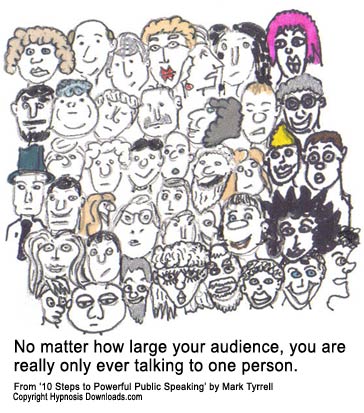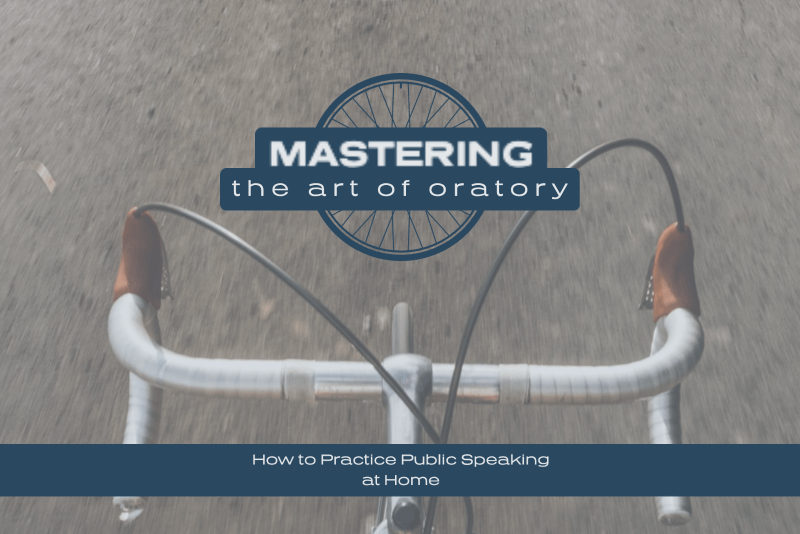How to Hypnotize Your Audience
Five Hypnotic Techniques to Engage Your Listeners
To hypnotize your audience, the first thing any good hypnosis trainer will tell you is that a competent hypnotist is confident. Through self-assurance, you inspire faith by your subject, and they feel free to relax with you.
The same is true if you want to hypnotize your audience when presenting a speech. First, you need to inspire confidence by the audience in your capability and to do that you need to be be free of anxiety.
And when I talk about hypnotizing your audience, please forget the clichés of watch swinging, cluck-like-a-chicken merchants. I'm talking about the hypnosis of life.

Help your audience leave the room
When you hypnotize someone, you get them to "leave the room" as they "travel" along with your narrative within their mind.
You achieve this by focusing their attention so intently that your words start to have a real effect on their experience - both conscious and unconscious. A skilled hypnotist can help you change the workings of your immune system or blood flow with their words. Think what effect you could have on an audience you are looking to influence.
So why do I talk about "hypnosis" when describing the effect a great presenter has?
Hypnosis and the art of presenting
Hypnosis involves:
- Narrowed Focus
- Disassociation
- Learning
Any presenter will agree that you want to be compelling enough to focus your audience on what you are saying. You want them disassociated from their environment and concerns so that they travel with you to other times, places and possibilities. And you want them to adopt, at least for a while, new ways of seeing reality.
Hypnosis in therapy is
so powerful because it helps people learn new ways of responding to life
so that low confidence, phobias or addictions no longer trip them up.
When you present powerfully, you focus your audience's attention so
narrowly that the nature of their learning becomes hypnotic rather than
merely conscious. This kind of education feels more profound for
people.
Avoiding the boredom trance
However, there are different kinds of audience trances. If you are uninspiring, then you may hypnotize your audience by causing them to mentally "leave the room." The group will not follow your ideas, but instead attempt to escape your talk. They might start to imagine what they'll do later, what they'll cook for dinner or their upcoming social arrangements. The audience disassociates, but not in the way we want. Nevertheless, there are specific techniques to compel your viewers in just the right direction.
Crowd hypnosis
Proficient public presenters will captivate audiences with their words and gestures. They'll use expectation, language, storytelling, and "future pacing," which means they'll implant ideas for their listeners to act upon in future. These techniques are all useful to hypnotize your audience. Hypnotic speakers don't just give the facts. Instead, these orators will give their listeners an experience that will change the way they feel, think, or behave. Hypnotic presenting appeals to the part of the mind that the most significant pieces of poetry or music do. Truly world-beating public talks have a real rhythm.
The poetry of presenting
The best speeches like the best hypnotic inductions have a kind of trance rhyme to them which draws you in and makes you forget anything other than the address.
Listen to Sir Winston Churchill on YouTube.
Churchill uses repetition, emotive words. He paints a picture of a positive future beyond current hard times, but he doesn't lie to his listeners by pretending things are going to be easy. Churchill connects what is relevant to his listeners and evokes sharp images. And, like the language of storytelling or even epic myth, he remarks about avoiding an oncoming "Dark age" by fierce, proud, brave and collective struggle.
In some of Churchill's speeches, his language is almost confusing, which is a favorite hypnotic technique. A speaker can use intentional confusion to "tie up the conscious mind" and appeal more directly to the unconscious. The subconscious absorbs words often before the conscious mind untangles meaning, for example: "Never was so much owed by so many to so few." He states this phrase while talking about the heavily outnumbered RAF men who fought the famous Battle of Britain. We, the listeners, know what he means without following the logical thread of the statement.
If you want to be more hypnotic to captivate the attention and hypnotize your audience, then you might like to put these following tips into action. Which are expanded in a 10 steps to powerful public speaking course from hypnosisdownloads.com. (Affiliate link.)
1. Pepper your speech with words that appeal to feelings.
Words that people have to "go inwards" to connect personal meaning with are called nominalizations, and they help to hypnotize your audience. These are words like: "Powerful, beautiful, love, wisdom, strength"...and so on. Make sure these kinds of words fit with what you are saying. These words used correctly will produce more of a response than more "concrete" type words.
2. Paint pictures in listener minds by overlapping senses
When we hypnotize someone we are seeking to give them a dream-like experience. And of course, we dream in pictures, and also sounds, sensations, tastes, and emotions. If you are telling a story in your speech about something that happened to you, tell them what you saw, felt, heard, tasted, and so forth. These appeals to the senses make a speech so much more evocative. "I went to the mall and saw a fight" doesn't draw you as much as: "I was heaving a heavy shopping bag through the mall when I heard a sickening scream. I turned and saw two huge guys trying to mug an old lady who karate kicked them to kingdom come. You could almost smell their fear!" Be descriptive.
3. Tell stories to hypnotize your audience
Even if you are delivering a speech about molecular biology, there are stories to be told - tell them engrossingly.
4. Use your voice to fascinate
Sometimes speed up and sometimes -- slow down -- a bit. Not all the time or else you will annoy, but think about the importance and relevance of your words. When delivering a point with emphasis, decrease the pace of your words. Occasionally you can even talk with the calm, slow delivery of a real hypnotist.
5. Use unexpectedness
We go into hypnotic trance when we relax but also when we are startled, surprised, or even shocked. Great speakers use humor because it can be hypnotic. Humor surprises you - a punch line has a "punch" because it causes surprise. Hypnotists (especially of the stage show variety) will often use "shock "to fast track subjects into a hypnotic trance. So, be a little surprising here and there to keep your audience focused, then refocused. This technique, when presenting, is startlingly powerful.
In the end, it's all about the emotion.
Study the effect communication has on people. Just the bits of sound we call "words." It can make them angry, weep, be prepared to go into battle and change their life infinitely for the better. Words don't have to be "just words." Hypnotize your audience to help them feel something real when you speak.




